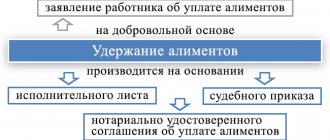An informal, verbal agreement between parents to pay child support over the years can result in headaches for the payer. If it is necessary to prove that alimony was paid , but there are no documents on hand, the court has the right to order payments again. The ideal solution would be to draw up an agreement for the fulfillment of obligations with a clear withdrawal schedule and receipt deadlines, supported by payment transfers.
Initial appeal to court
If the mother has not previously applied for judicial protection to withhold alimony payments from the children’s father, then in the claim it is enough to write: “the child’s father does not provide any financial support to the minor, which is why the mother cannot provide him with an adequate standard of living.”
There is no need to confirm the absence of money transfers from the father. If the man fails to prove that money for the children was transferred to the mother, then the claims will be satisfied.
To prove the fact of participation in the life of minors, the father may present the following evidence to the court:
- bank statements about transfers (withdrawals) of money;
- cash receipts confirming the purchase of clothing, medicines, toys for the child;
- testimony of relatives and friends;
- receipts for payment of tutors, sections, clubs and other things.
But courts accept such evidence as additional expenses for children. The fact of payment of alimony payments can only be confirmed by receipts for receiving money, receipts from a bank or mail. The documents must indicate the purpose of the transfer, the name of the recipient and the payment period: “alimony for November 2020 for Anna Kiseleva.”
To assign child support, the mother only needs to confirm the fact of cohabitation with the child with the following documents:
- certificate of family composition according to form No. 9;
- a certificate from a school or kindergarten confirming that the child is studying in the area where the mother lives;
- to confirm good living conditions, the mother can provide the court with an inspection report of the apartment by the guardianship authorities;
- testimony of witnesses.
Rules for drawing up receipts
Lawyers recommend adhering to the following rules.
- Describe the circumstances of the transfer of money as accurately as possible, calling things by their proper names.
- The document must be written by hand. This is done so that in case of a dispute there is an opportunity to conduct a handwriting examination. Although the machine filling method is not expressly prohibited by law.
- Bring witnesses. If the case comes to trial, they will be able to confirm that the money was transferred without any coercion, and that its delivery actually took place. Data about third parties must be included in the document. The involvement of witnesses is not necessary, but when transferring large sums it will not hurt, because the examination is appointed only in exceptional cases. There is no need to have the receipt certified by a notary; a simple written form is sufficient. Requirements:
- easy to read text without errors or blots;
- The sheet format does not matter;
- The use of a free-form form is permitted, but ultimately handwritten text should prevail;
- special attention should be paid to numbers - amounts and dates;
- the amount must be recorded in words and numbers;
- The currency must be precisely defined, kopecks are indicated separately;
- It is imperative to sign the person who received the money; it is welcome when both parties have endorsed the document.
The receipt should include the following information:
- FULL NAME. parties, their passport details;
- contact information of the payer and recipient of funds;
- place of drawing up the document and transfer of money;
- date;
- the purpose of the transfer of funds is alimony payments;
- information about the child for whose maintenance money is paid;
- sum;
- signatures.
If there are witnesses, their full names, passport details, addresses and contact information are reflected. The alimony provider must insist that a document be drawn up every time money is transferred. He needs to keep the receipts at least until the child turns 21 years old - until this period, a claim from the recipient of funds for the collection of alimony for the past period is not excluded.
If it is necessary to collect alimony for the past period
Debt on alimony payments can only be withheld for the previous 3 years. To do this, the mother will need to present to the court undeniable evidence that she made attempts to obtain money. In this case, a fact confirming the absence of payments is not enough.
The most important principle of legislation in the field of civil procedure is that each party must prove the circumstance that is controversial. If a woman wants to prove in court that her ex-husband has not previously provided financial support to children, then she only needs to present evidence confirming her repeated requests for alimony. Such evidence could be:
- printing of emails and correspondence;
- copies of letters sent to the father with notification of receipt;
- audio recordings of telephone conversations;
- a copy of the application to the magistrate's court for issuing an order to withhold alimony payments, if within 10 days after receiving the document the father sent a petition to the court to cancel the order;
- a notary-certified protocol for examining a page on social networks or a website through which the mother corresponded with the defaulter;
- copies of statements for social protection or law enforcement agencies regarding the lack of alimony payments.
Is a receipt considered admissible evidence?
A receipt is a document where the recipient of money records the fact of transfer of cash in a certain amount at a specific time. It is issued to the payer and serves as proof of payment.
But sometimes, even if the money was actually paid, the receipt is not always recognized as a valid document. The reason for this is non-compliance with the terms of the law. For example, in the Certificate based on the results of a study of court cases in the Primorsky Territory for 2013, there are several situations where the agreement between the parents was not certified by a notary, and the spouses tried to confirm the fact of payments with a receipt. According to the magistrate of the Leninsky district, the basis for calculating alimony should be a document of the established form; the usual written recording of the transfer of money is not enough. Many other judges share the same opinion.
But in 2020, the Supreme Court clarified some provisions of the Civil Code of the Russian Federation regarding the transfer of funds by receipt. Although we are talking about a loan, it is believed that the clarifications can also be applied to alimony legal relations. So, in Art. 162 of the Civil Code of the Russian Federation states that if the parties do not have official grounds for transferring money, any written document will be suitable as evidence. Therefore, a receipt in this case can confirm the payment, but for this it must be drawn up correctly.
Thus, a receipt is a document that can be used to confirm payment. But it is undesirable to use it, since the legislator requires that funds for the child be withheld on the basis of a notarial agreement, which will spell out a specific procedure for payments or a court decision. It is advisable to use a receipt if there is already an agreement or a judicial act.
If there is a court decision
If alimony maintenance was previously determined in court, then bailiffs will monitor the process of execution of the decision. In the absence of payments, a debt will arise, and bailiffs will begin to take the necessary actions to collect it.
To retain the debt, the bailiff may hold the debtor to property liability:
- the bailiff may seize the bank accounts and property of a negligent father;
- a defaulter’s driver’s license may be invalidated;
- the man will not be able to travel abroad;
- malicious defaulters hiding from FSSP employees are brought to criminal liability.
Criminal legislation provides for the following types of liability for persistent defaulters:
- arrest for up to 3 months;
- imprisonment for a period of up to 12 months;
- correctional work.
For each day of delay, the mother of the children may demand payment of a penalty in the amount of 0.1%. This requirement should be indicated in the claim for collection of alimony debt.
Deprivation of parental rights
Article 69 of the RF IC allows you to deprive the rights of a parent of a persistent alimony defaulter. This procedure is carried out in court, so the child’s mother will need to send a corresponding claim to the district court.
If the claims are satisfied, the father’s obligations to provide financial support for the children are not relieved. Withholding of child support payments will continue until the children reach adulthood.
How to find out your ex-husband's income for alimony
To determine ways to find out your ex-husband’s salary for alimony, you need to familiarize yourself with the most common tricks used by persistent defaulters who ignore parental obligations.
Concealing income when paying alimony is a frequent phenomenon and is expressed in the following actions of the defaulter:
- The official place of employment is changed so that the salary is lower according to the documents.
- They ask the employer to indicate an underestimated amount on employment documents.
- They sign a letter of resignation and continue to work there.
- They transfer the property to relatives and formally sell it to their loved ones.
If companies are small, it is much easier to negotiate changes in pay and work informally. This means that the chances of being underpaid are higher. If the alimony payer works in a large organization, it is unlikely that the management will agree to unofficial employment and falsification of documents.
When a man deliberately tries to underpay or hide his entire income, this is a direct consequence of his reluctance to allocate funds for the child, and the mother will need to make efforts to find and prove the fact of evasion of child support. Relying on women's legal helplessness, defaulters feel confident that they will not face any consequences. In fact, if you collect evidence, the man can be charged under Art. 157 of the Criminal Code of the Russian Federation for concealing income when paying alimony, liability for which provides for criminal punishment.
If the mother needs to prove payment of child support
In some situations, the mother will need to prove to the court that the ex-husband is fulfilling alimony obligations:
- a procedure has been initiated to deprive the father of parental rights;
- the mother of the minors also claims child support.
To prove that the mother has paid, it is enough to present to the court any evidence confirming the father’s participation in providing for the minors. Such evidence could be:
- checks for the purchase of goods for children with the details of the father’s bank card;
- bank statements about the movement of funds on the account, card of the ex-spouse;
- testimony of witnesses, friends, relatives.
Such evidence will be required to be presented to the court, even if both parents confirm the fact of payment of child support payments. If the issue of assigning alimony support to a minor is being decided, which will entail a reduction in the amount collected for another child.
I paid alimony unofficially, how can I prove it?
The main evidence of unofficial alimony payment is:
- A receipt or statement received from the organization (bank, post office) through which the funds are transferred.
- Receipt. The document is drawn up by both parties. The presence of 3 persons is not required. If it is alleged that the receipt is false, the payer can go to court and request an examination of the handwriting.
- Testimony of witnesses. The presence of third parties has little effect on the outcome of the case, but can create a real picture of the payer’s role in the child’s life. Witnesses will tell you how often the father (mother) visited the children, what purchases were made, and whether there were disputes about the payment of alimony.
- Evidence on video or audio media.
It is necessary to prove the intended purpose of the payments, that is, that the money was directed to the needs of a minor child.
If receipts are not saved
The trust and carelessness of the payer can play a cruel joke on him: knowing about the lack of evidence, the recipient has the right to go to court with a request to collect the debt for the previous 3 years, arguing that he supports the child himself and receives nothing. The payer needs to know that, according to 107 RF IC:
- Alimony is assigned from the moment the person raising the child applies to the court.
- Alimony can be recovered for the past period within 3 years before the filing of the claim, if the claimant proves that he tried in every possible way to resolve the issue of alimony, but was refused every time. At the same time, the person obliged to provide for the child financially avoided fulfilling his parental duty.
If the plaintiff insists that he did not receive funds and tries to slander his spouse, evidence of consent to child support may be:
- information from SMS, postal, electronic correspondence, where the recipient asks for money, and the defendant gives consent;
- testimony of witnesses in which further financial support for the family was discussed;
- a statement received from a bank indicating regular receipts of a certain amount of money into the account of the ex-wife.
It is necessary to carry out painstaking work to find evidence of payment of alimony or consent to child support. The court does not take into account unsubstantiated assurances and takes the side of the recipient.
Is it possible to prove that the father never supported financially?
This procedure does not make sense, since the debt, in accordance with the law, is collected for the previous 3 years. You can apply to the court even after the child reaches adulthood. But it is worth considering that it will not be possible to collect the alimony debt for 3 full years. When applying to court after turning 18, to determine the period for which the debt can be collected, the period that elapsed between the age of majority and applying to the court should be subtracted from the 3-year period.
Termination of paternity
Depriving the parental rights of a spouse who does not pay child support is a last resort. Along with the satisfaction of the claim for termination of parental obligations in relation to the child, the mutual responsibilities of children to care for their parents also disappear after reaching the age of full legal capacity.
Important! Deprivation of parental rights is not grounds for stopping payments, but such an initiative may help the spouse pay the debt.





